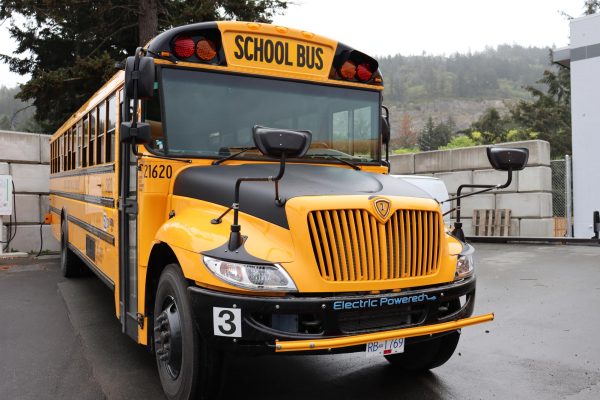Today, one of the biggest challenges facing our society is the effects of climate change. Within the discussion, many are wondering how we can bring our FM community to reverse climate change? It starts with an integral part of our district, school buses.
Bringing electric buses into districts would reduce each bus carbon footprint by 100 percent. According to Barry Carr, the director of Clean Communities of Central New York, “School buses are a logical first step because the district knows exactly how far that school bus has to go.” New York State is requiring districts to purchase electric school buses by 2027 and wants school bus systems to be completely electric by 2035. “It’s our quest to try to get every district to try one or two electric school buses,” said Carr. CCCNY is a non-profit organization that is funded by the U.S Department of Energy. “To me, there’s no good excuse to not start. That’s really the message we want to put out there.”
Between state funding, federal funding, and tax credits for school districts, every district can get help with the cost of electric school buses. The number of costs for maintenance in an electric car are also significantly less than that in school buses. After all, electric buses don’t need oil changes!
Some districts have switched to propane buses, a step towards electric fueling. Propane is still a fossil fuel, but it has 60 percent less emissions than diesel. Carr said, “I think people should take baby steps, always try to do something more efficient. You don’t have to do this all at once.”
There are health benefits in terms of quality of air that an electric bus has over a diesel bus. Even buses that are idling can produce particulate matter that is dangerous for children who are still growing. Particulate matter, which is a part of the combustion process of bus fuel, is known to cause childhood asthma, and has carcinogens.
Unfortunately, some people are not so keen on the idea. They criticize the fact that fossil fuels are required for production of electricity. But what does not get considered is that an electric bus is still 2 to 3 times as efficient as an internal combustion bus. Additionally, others believe that electric vehicles won’t go as far in cold weather. Sure, instead of going 140 miles between charges you can go about 100 miles between charges, but the average school bus route is 70 miles so it’s still adequate.
Peter Wirth is the vice president of Climate Change Awareness and Action which is a local organization whose focus is on climate change and education around it. Wirth reminded us, “The climate is always changing but it should happen in geologic time…to see in one lifetime a really significant change in the environment is a sign that the system is unstable.” Humans are accelerating the pace of change which is detrimental to our society’s future.
We still have time to slow down the process of climate change by making the step to switch to electric buses. Unless we reduce the amount of greenhouse gasses that go in the atmosphere, the planet will keep warming. “Your future will be greatly impacted by the ability for us to make the transition from a fossil fuel economy to more of an electric economy,” said Wirth. “People forget, we’ve made these transitions before. At one point, we used coal…we can go from fossil fuels to electric, we’ve done it and we can do it. Any transition has bumps in the road.”
On this Thursday, September 19th, 2024 there will be a meeting at the Fayetteville Free Library to discuss the funding issues involving electric buses. Both Wirth and Carr will be there along with many other experts of the topic. It’s a great opportunity for students to learn more about this important topic.

www.flickr.com/photos/bcgovphotos/51161934828 (Province of British Columbia photo stream)










